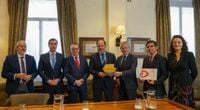Madrid is taking significant strides towards enhancing its water management and infrastructure efficiency, as highlighted by recent developments involving the Canal de Isabel II. A study presented on March 26, 2025, at the VI Encuentro del Aula Universitaria Madrid Subterra-UPM revealed that the Canal's potable water network has the potential to regulate the temperature of the Madrid Metro's infrastructure by up to 6 degrees Celsius. This innovative approach could not only improve comfort for commuters but also reduce energy consumption for air conditioning in technical rooms.
The study emphasizes that the constant temperature of the potable water network can extract thermal energy without disrupting services provided by Canal de Isabel II or the Metro. This is achieved through a heat exchange system that utilizes large fancoil units, similar to car radiators, to cool the air in Metro ventilation systems. By leveraging the cooler temperature of the water, the system could significantly lower the heat levels experienced by users in Metro stations.
Javier Muñoz Antón, the director of the Aula Universitaria Madrid Subterra at UPM, explained that this geothermal-like approach could also assist in the transfer of potable water and cooling systems, albeit with certain restrictions to ensure non-intrusive methods. In a related project, the potential of wastewater to provide heat and domestic hot water to the Canal’s Sala Canal building was also discussed, which could lead to a 23% reduction in heating energy demand, benefiting approximately 6,000 people monthly and resulting in a carbon dioxide emissions reduction of over 100 tons annually.
On the same day, Belén Benito, the Director of Operations for Canal de Isabel II, made headlines by appearing on the program 'La Revuelta.' This marked the first time a civil engineer specializing in water management was featured on prime time television. Benito, who has over 30 years of experience managing water resources in Madrid, spoke passionately about the recent storms that had filled reservoirs across Spain. During the interview, she announced that the average capacity of the reservoirs had risen to 71%, thanks to the rainfall in March.
"We’re all much more relaxed, but let’s not get complacent: every drop counts and should be used wisely," Benito urged, emphasizing the importance of responsible water usage even with the increased reservoir levels. She expressed her concern that the public should not waste water simply because the reservoirs are full. Her remarks resonate with the ongoing dialogue about water conservation in Spain, especially after months of drought in various regions.
In a light-hearted moment during the interview, Benito gifted host David Broncano a bottle of tap water from Madrid, highlighting the excellent quality of the city's drinking water. "The water in Spain is of fantastic quality everywhere," she stated, reinforcing the importance of appreciating this valuable resource. However, when Broncano playfully wasted some of the water, Benito reacted with dismay, indicating her strong commitment to water conservation.
Benito's visit to 'La Revuelta' not only shed light on the current state of water management in Madrid but also showcased her extensive background. She holds a degree in Civil Engineering with a specialization in hydraulics and energy from the Polytechnic University of Madrid, and she has held various positions within Canal de Isabel II since 2000. Her expertise has earned her recognition, including the Medalla al Mérito Profesional from the Colegio de Ingenieros de Caminos, Canales y Puertos in 2016.
In addition to the informative discussions on water management, the program celebrated the improved hydrographic situation with a unique performance featuring the song "Aquarius," accompanied by a lively choreography. The event also included a special performance by artist Valeria Castro, who is scheduled to perform at the Movistar Arena in Madrid on January 9, 2026.
Furthermore, Canal de Isabel II has recently been awarded the IMPACT AEERC 2025 award by the Asociación Española de Expertos en la Relación con Clientes (AEERC) for its innovative customer service and remote meter reading initiatives. Since 2023, the Canal's contact center has specialized in tele-reading, proactively reaching out to over 112,000 clients to inform them about the benefits of the new system. This proactive approach has allowed customers to detect potential water leaks, access their consumption data, and configure personalized alerts, all aimed at promoting responsible water usage.
Currently, over 660,000 meters are connected to the intelligent measurement system, and the goal is to connect 100% of the meter park by the end of 2026, which would involve integrating a total of 1.65 million units. This ambitious plan is supported by the implementation of NB-IoT technology, which allows for hourly consumption recording and significantly enhances the detection of anomalies.
Canal de Isabel II's digital transformation has not only impacted local water management but has also drawn interest from countries like the United States and Singapore, which are leaders in water cycle digitalization. The innovative tele-reading model has been presented at various national and international forums, reinforcing Canal's position as a pioneer in the sustainable management of water resources.
In conclusion, the recent developments surrounding Canal de Isabel II reflect a commitment to improving water management and customer service while emphasizing the importance of sustainability. As Madrid continues to face challenges related to water supply and quality, the efforts of professionals like Belén Benito and the innovative projects undertaken by Canal de Isabel II will play a crucial role in ensuring a reliable and sustainable water future for the city.




